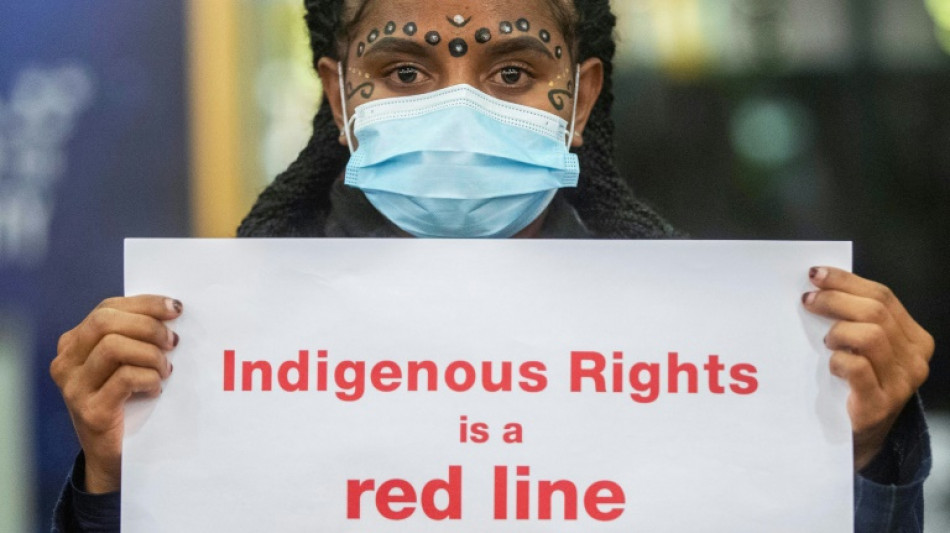
-
 Guinea junta chief Doumbouya elected president: election commission
Guinea junta chief Doumbouya elected president: election commission
-
Pistons pound Lakers as James marks 41st birthday with loss

-
 Taiwan coastguard says Chinese ships 'withdrawing' after drills
Taiwan coastguard says Chinese ships 'withdrawing' after drills
-
France's homeless wrap up to survive at freezing year's end

-
 Leftist Mamdani to take over as New York mayor under Trump shadow
Leftist Mamdani to take over as New York mayor under Trump shadow
-
French duo stripped of Sydney-Hobart race overall win

-
 Thailand releases 18 Cambodian soldiers held since July
Thailand releases 18 Cambodian soldiers held since July
-
Tiny tech, big AI power: what are 2-nanometre chips?

-
 Libyans savour shared heritage at reopened national museum
Libyans savour shared heritage at reopened national museum
-
Asia markets mixed in final day of 2025 trading

-
 Global 'fragmentation' fuelling world's crises: UN refugee chief
Global 'fragmentation' fuelling world's crises: UN refugee chief
-
Difficult dance: Cambodian tradition under threat

-
 Regional temperature records broken across the world in 2025
Regional temperature records broken across the world in 2025
-
'Sincaraz' set to dominate as 2026 tennis season kicks off

-
 Bulgaria readies to adopt the euro, nearly 20 years after joining EU
Bulgaria readies to adopt the euro, nearly 20 years after joining EU
-
Trump v 'Obamacare': US health costs set to soar for millions in 2026

-
 Isiah Whitlock Jr., 'The Wire' actor, dies at 71
Isiah Whitlock Jr., 'The Wire' actor, dies at 71
-
SoftBank lifts OpenAI stake to 11% with $41bln investment

-
 Bangladesh mourns ex-PM Khaleda Zia with state funeral
Bangladesh mourns ex-PM Khaleda Zia with state funeral
-
TSMC says started mass production of 'most advanced' 2nm chips

-
 Australian cricket great Damien Martyn 'in induced coma'
Australian cricket great Damien Martyn 'in induced coma'
-
Guinea junta chief Doumboya elected president: election commission

-
 Guardian Metal Resources PLC Announces Total Voting Rights
Guardian Metal Resources PLC Announces Total Voting Rights
-
Caballero defends Maresca after Palmer substitution sparks jeers

-
 Depleted Man Utd 'lack quality', says Amorim
Depleted Man Utd 'lack quality', says Amorim
-
'We know what we want': Arteta eyes title after Arsenal thrash Villa

-
 Arsenal crush Villa to make statement in title race
Arsenal crush Villa to make statement in title race
-
Senegal top AFCON group ahead of DR Congo as Tanzania make history

-
 Maresca in the firing line as Chelsea stumble against Bournemouth
Maresca in the firing line as Chelsea stumble against Bournemouth
-
Senegal top AFCON group, DR Congo to face Algeria in last 16

-
 Norway's Magnus Carlsen wins 20th world chess title
Norway's Magnus Carlsen wins 20th world chess title
-
Patriots star Diggs facing assault charges: reports

-
 Journalist Tatiana Schlossberg, granddaughter of JFK, dies at 35
Journalist Tatiana Schlossberg, granddaughter of JFK, dies at 35
-
Rio receives Guinness record for biggest New Year's bash

-
 Jokic out for four weeks after knee injury: Nuggets
Jokic out for four weeks after knee injury: Nuggets
-
World bids farewell to 2025, a year of Trump, truces and turmoil

-
 Far-right leader Le Pen to attend Brigitte Bardot's funeral
Far-right leader Le Pen to attend Brigitte Bardot's funeral
-
Drones dive into aviation's deepest enigma as MH370 hunt restarts

-
 German dog owners sit out New Year's Eve chaos in airport hotels
German dog owners sit out New Year's Eve chaos in airport hotels
-
Tanzania hold Tunisia to end 45-year wait for AFCON knockout spot

-
 10 countries warn of 'catastrophic' Gaza situation
10 countries warn of 'catastrophic' Gaza situation
-
Performers cancel concerts at Kennedy center after Trump renaming

-
 Burst tyre and speed contributed to Joshua crash say investigators
Burst tyre and speed contributed to Joshua crash say investigators
-
Students join Iran demonstrations after shopkeepers protest

-
 Johnson still a Spurs player despite Palace interest, says Frank
Johnson still a Spurs player despite Palace interest, says Frank
-
UAE to pull forces out of Yemen as 24-hour deadline set

-
 Chinese leasing firm CALC orders 30 Airbus A320neo planes
Chinese leasing firm CALC orders 30 Airbus A320neo planes
-
Germany bank heist nets about 30mn euros in cash, valuables: police

-
 AU observers praise 'peaceful' Central African Republic polls
AU observers praise 'peaceful' Central African Republic polls
-
Ivory Coast coach Fae backs switching AFCON to every four years


Things to know about global biodiversity agreement
After years of negotiations, the world has agreed a landmark deal to protect vanishing species and ecosystems.
Here are some of the strengths of the pact agreed at the UN meeting in Montreal called COP15, as well as where it fell short.
- '30 by 30' -
The cornerstone of the agreement is the so-called 30 by 30 goal -- a pledge to protect 30 percent of the world's land and seas by 2030 -- up from about 17 percent of land and seven percent of oceans currently.
The oceans target had reportedly been opposed by some countries but made it into the final text. Some experts had said 30 percent is a low aim, insisting that protecting 50 percent would be better.
- Indigenous rights -
Indigenous rights were addressed throughout the text, including in areas covered by the 30 by 30 pledge -- safeguarding Indigenous peoples' right to remain stewards of land they use and ensuring they are not subject to evictions in the name of conservation.
The International Indigenous Forum on Biodiversity praised the text for its "strong language on respect for the rights of Indigenous Peoples and local communities."
- Funding -
The text approves the objective for rich countries to provide "at least US$20 billion per year by 2025, and ... at least US$30 billion per year by 2030," approximately double and then triple the current international aid for biodiversity.
Developing countries were seeking a new funding mechanism, but developed nations said it would take several years to create.
A halfway solution was adopted: a "trust fund" within an existing financial mechanism called the Global Environment Facility, as a stepping stone towards a new fund.
- Pesticides -
The accord prescribes efforts for "reducing the overall risk from pesticides and highly hazardous chemicals by at least half."
Some delegates and campaigners had argued that the emphasis should be on overall pesticide "use" which is easier to measure. But specialists said some pesticides are powerful in small quantities so the emphasis should be on "risk."
- Genetic sequencing -
The framework demands people receive benefits from "genetic resources" originating in their countries: natural assets, such as medicine or cosmetic ingredients in plants, which may be sourced in a developing country but then have their genetic information mapped and shared with researchers and companies abroad.
The text calls on parties to "ensure the fair and equitable sharing of benefits that arise from the utilization of genetic resources and from digital sequence information" and "traditional knowledge" associated with them.
- Business -
Despite common fears of "greenwashing" at environment summits, several delegates and observers said businesses played a largely positive role at COP25. But some noted lacked a strong mandate for businesses to assess and report on their biodiversity impacts -- the accord instead merely urged countries to "encourage" them to do so.
Eliot Whittington, director of policy at the says Cambridge Institute for Sustainability Leadership, said the accord should "prompt a new mandatory disclosure framework for larger businesses... something the business community has supported vigorously at COP15."
- Milestones -
The document sets a mechanism for implementation of the deal, but it is less strict than the Paris climate agreement. Campaigners complained the COP15 text did not contain enough "milestones" for marking progress.
For example, the text says human-induced extinction of known threatened species must be halted, and, by 2050, the extinction rate of all species reduced tenfold -- but there aren't targets that countries must hit before that year.
O.Johnson--AMWN


